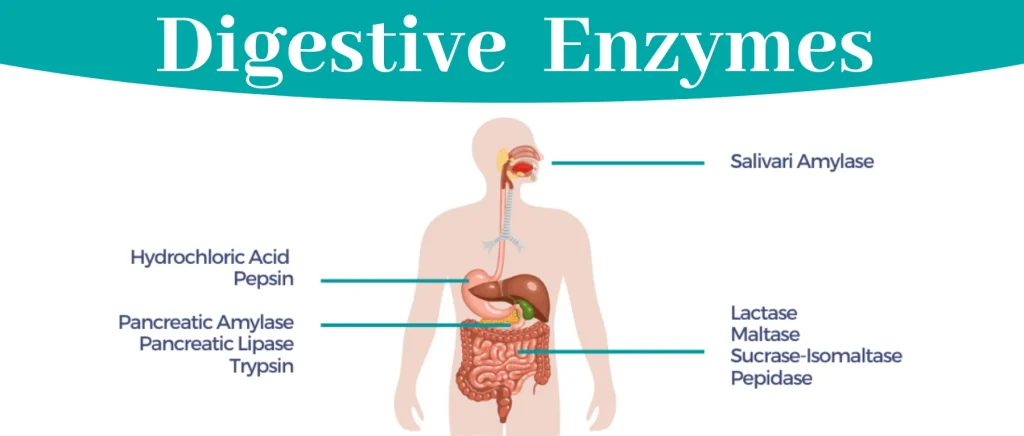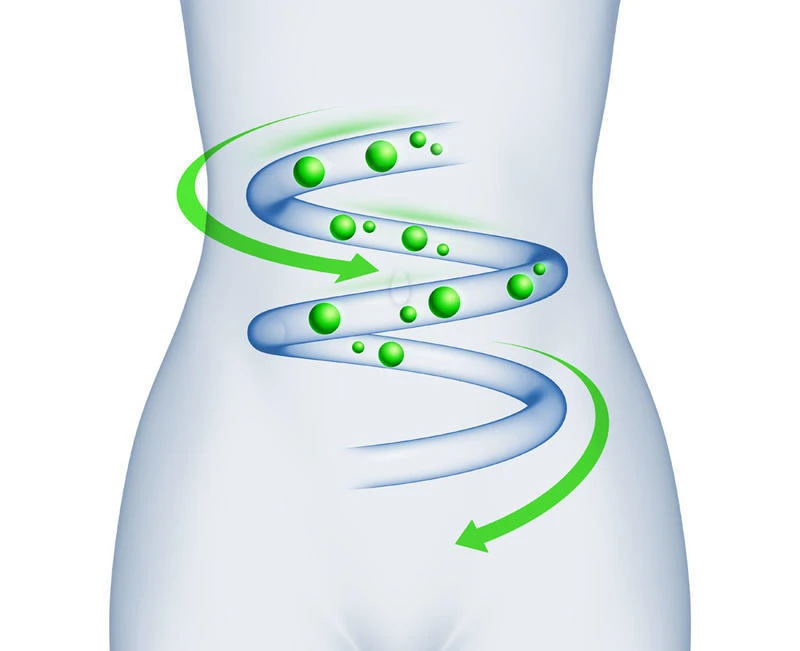Understanding Digestive Enzymes
Digestive enzymes are essential proteins that help break down food into absorbable nutrients. These enzymes ensure that our bodies efficiently process carbohydrates, proteins, and fats, allowing us to extract the necessary vitamins and minerals from our diet. Without adequate enzyme function, digestion can become sluggish, leading to bloating, gas, and nutrient deficiencies.
Digestive enzymes are produced mainly in the pancreas, stomach, and small intestine, with some also found in saliva. Their role is crucial in preventing undigested food from fermenting in the gut, which can lead to discomfort and poor health outcomes. When digestive enzymes function properly, they contribute to optimal nutrient absorption, energy production, and overall digestive comfort.

Types of Digestive Enzymes and Their Functions
- Amylase – Breaks down carbohydrates into simple sugars. Found in saliva and the pancreas, this enzyme is essential for digesting starches.
- Protease – Helps digest proteins into amino acids. Proteases like pepsin, trypsin, and chymotrypsin are produced in the stomach and pancreas.
- Lipase – Aids in breaking down fats into fatty acids and glycerol. Lipase is produced in the pancreas and helps digest oils and fats.
- Lactase – Specifically helps in digesting lactose, the sugar found in dairy products. Without enough lactase, individuals may develop lactose intolerance.
- Cellulase – Assists in breaking down fiber, which is otherwise indigestible by the human body. This enzyme is typically found in plant-based foods.
- Maltase – Breaks down maltose, a sugar found in grains and malted foods, into glucose for energy.
Signs of Digestive Enzyme Deficiency
A deficiency in digestive enzymes can lead to discomfort and poor nutrient absorption. Some common symptoms include:
- Frequent bloating and gas
- Indigestion or heartburn
- Unexplained weight loss or malnutrition
- Food intolerances, particularly dairy or gluten
- Persistent diarrhea or constipation
- Fatigue due to inadequate nutrient absorption
- Stomach cramps after eating fatty or protein-rich foods
Natural Sources of Digestive Enzymes
Certain foods naturally contain digestive enzymes that can support your gut health. Including these in your diet can aid digestion and alleviate discomfort:
- Pineapple (rich in bromelain, a protease enzyme)
- Papaya (contains papain, another protease)
- Fermented foods like kimchi, sauerkraut, and kefir (rich in probiotics and enzymes)
- Bananas (contain amylase and maltase for carbohydrate digestion)
- Avocados (naturally high in lipase for fat digestion)
- Ginger (enhances digestive enzyme activity and reduces bloating)
- Raw honey (contains a variety of digestive enzymes such as diastase and invertase)
Digestive Enzyme Supplements: Do You Need Them?
For some individuals, dietary sources may not be enough, and supplementation might be necessary. Digestive enzyme supplements are particularly useful for people with:
- Lactose intolerance – Supplementing with lactase can help digest dairy products.
- Pancreatic insufficiency – Conditions like chronic pancreatitis can reduce enzyme production.
- Aging-related enzyme decline – Enzyme production naturally decreases as we age, leading to slower digestion.
- Irritable bowel syndrome (IBS) – Some people with IBS find that enzyme supplements help reduce bloating and discomfort.
- Celiac disease – Those with gluten intolerance may benefit from enzyme support to break down gluten proteins more efficiently.

How to Choose the Right Digestive Enzyme Supplement
If you are considering digestive enzyme supplements, here are some factors to keep in mind:
- Check for a broad spectrum – Choose a supplement that contains multiple types of enzymes (amylase, protease, lipase, etc.) for comprehensive digestive support.
- Look for plant-based options – These tend to be more stable and effective in various pH levels within the gut.
- Consider your specific needs – If you have trouble digesting fats, choose a formula high in lipase; for protein digestion, opt for one rich in protease.
- Look for enteric-coated enzymes – This ensures that the enzymes survive stomach acid and reach the small intestine for maximum effectiveness.
We also have other tips of the nutritions https://www.fitpeak10.com/index.php/category/nutrition/
Improving Digestion Naturally
In addition to enzyme-rich foods and supplements, other lifestyle habits can support digestive health:
- Chew Your Food Thoroughly – Digestion begins in the mouth, and proper chewing can ease the workload on your stomach.
- Eat a Balanced Diet – Incorporate fiber, protein, and healthy fats to optimize digestion.
- Stay Hydrated – Water is essential for enzyme function and nutrient absorption.
- Reduce Stress – Chronic stress can negatively impact digestion by reducing enzyme production.
- Exercise Regularly – Physical activity helps stimulate the digestive process and prevents sluggish metabolism.
- Avoid Overeating – Eating smaller, frequent meals can help prevent digestive discomfort and enzyme overload.
- Limit Processed Foods – Highly processed foods lack natural enzymes and can strain digestion.
The Role of Probiotics in Digestive Health
Probiotics are beneficial bacteria that support the gut microbiome. While they do not directly replace digestive enzymes, they promote an environment where enzymes can function optimally. Including probiotics in your diet through fermented foods or supplements can further enhance digestive efficiency. A balanced gut flora improves digestion, reduces bloating, and strengthens immunity.
Conclusion
Digestive enzymes play a critical role in nutrient absorption and overall gut health. Whether obtained through diet, supplements, or lifestyle changes, optimizing enzyme function can lead to improved digestion, reduced discomfort, and better overall well-being. If you experience persistent digestive issues, consulting a healthcare professional can help determine whether enzyme supplementation is right for you. By making small yet meaningful changes in your diet and lifestyle, you can ensure that your digestive system functions optimally and supports your overall health.
To gain a better understanding of digestive enzymes and their benefits, you might find the following video helpful:https://www.youtube.com/watch?v=a0yGDipKWlo&t=1s


